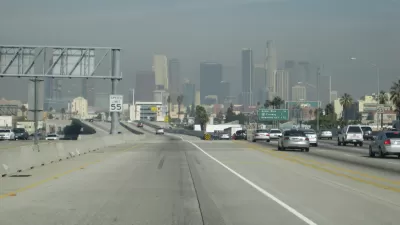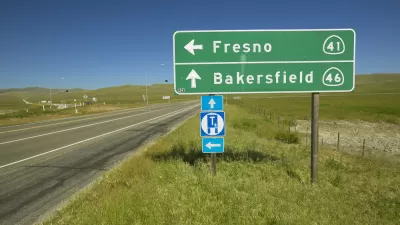The USA Today editorial board argues that increasing the gas tax is the best way for states to fund transportation while Congressman Earl Blumenauer (D-OR) extolls Oregon's VMT fee pilot project, which the editors calls complex and bureaucratic.
In this "Our View"/"Opposing View" debate on transportation funding, both sides agree that the current system - where many states and the federal government haven't increased gas taxes in decades, leaves roads in bad repair and the federal Highway Trust Fund headed for bankruptcy. They differ on the solution.
The editors first take aim at the "punitive" Virginia gas excise tax replacement that includes new hotel and sales taxes and a new hybrid/EV fee.
As for Oregon's Vehicle Mileage Traveled fee experiment, "the state has engineered a complex bureaucratic system that accomplishes little that a gasoline tax doesn't", they write.
(The gas tax) has the great virtue of being uncomplicated and fair. The people who pay the most gas tax are those who drive the most and use the most gas. Makes sense to us.
Most states have plenty of room to bump up their taxes without resorting to more intrusive alternatives.
In fact, this year governors in Wyoming, Maryland and Vermont have signed bills that increased their gas taxes.
Blumenauer writes, "With the purchasing power of the gas tax dwindling, the most promising funding alternative is a vehicle-mile-traveled fee (VMT), which Oregon is helping to develop as an alternative revenue source."
Oregon just completed the second phase of a 10-year VMT pilot project that demonstrated simple, practical technologies to keep track of miles driven and assess a road fee.
The editors themselves acknowledge the alternative approaches taken by the pilot project:
It is testing a plan to replace its gas tax with a mileage fee, one with five options for reporting miles driven. Two options would involve transponders in cars that transmit GPS data to the mileage fee agency. Two would transmit mileage but not locational data. A fifth would have drivers getting their odometers checked periodically, presumably at inspection time.
Blumenauer has "developed legislation to extend the Oregon pilot project to other states so drivers can understand the benefits of a new VMT system that pays for necessary road use and makes driving easier and more convenient."
He concludes, "The VMT is the most promising mechanism for funding the transportation demands of today and, especially, tomorrow."
This debate was very similar to one that appeared in The Wall Street Journal and posted here. Robert Poole, director of transportation policy at the Reason Foundation, took a position similar to Rep. Blumenauer.
FULL STORY: Gas tax alternative drive takes wrong turn: Our view

Alabama: Trump Terminates Settlements for Black Communities Harmed By Raw Sewage
Trump deemed the landmark civil rights agreement “illegal DEI and environmental justice policy.”

Planetizen Federal Action Tracker
A weekly monitor of how Trump’s orders and actions are impacting planners and planning in America.

The 120 Year Old Tiny Home Villages That Sheltered San Francisco’s Earthquake Refugees
More than a century ago, San Francisco mobilized to house thousands of residents displaced by the 1906 earthquake. Could their strategy offer a model for the present?

In Both Crashes and Crime, Public Transportation is Far Safer than Driving
Contrary to popular assumptions, public transportation has far lower crash and crime rates than automobile travel. For safer communities, improve and encourage transit travel.

Report: Zoning Reforms Should Complement Nashville’s Ambitious Transit Plan
Without reform, restrictive zoning codes will limit the impact of the city’s planned transit expansion and could exclude some of the residents who depend on transit the most.

Judge Orders Release of Frozen IRA, IIJA Funding
The decision is a victory for environmental groups who charged that freezing funds for critical infrastructure and disaster response programs caused “real and irreparable harm” to communities.
Urban Design for Planners 1: Software Tools
This six-course series explores essential urban design concepts using open source software and equips planners with the tools they need to participate fully in the urban design process.
Planning for Universal Design
Learn the tools for implementing Universal Design in planning regulations.
Clanton & Associates, Inc.
Jessamine County Fiscal Court
Institute for Housing and Urban Development Studies (IHS)
City of Grandview
Harvard GSD Executive Education
Toledo-Lucas County Plan Commissions
Salt Lake City
NYU Wagner Graduate School of Public Service





























